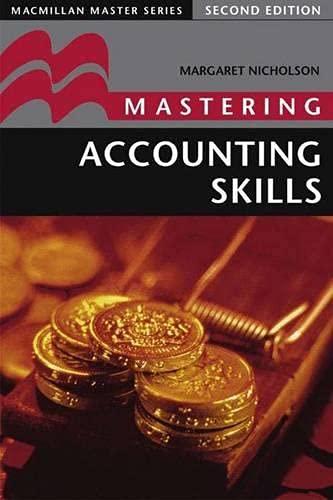DougWigby pays all receipts into his bank account and makes all payments greater than 15 by cheque.
Question:
DougWigby pays all receipts into his bank account and makes all payments greater than £15 by cheque. All other payments are made out of petty cash, at the end of each week the petty cash is restored to the imprest amount of £50.
On 5 January 20-7 DougWigby’s bank cash book showed a balance in the bank of £620.78 and there was £50 in his petty cash.
Paying-in book counterfoils showed:
Jan 5 Cheque of £106.39 from Ian Tait 6 Cash from sales £195.72 and a cheque from Martin Quantrill for £97.50 in settlement of a debt of £100 8 Cash from sales £160.58 9 Cash from sales £248.03 and a cheque for £135 from Bridget Rogers Cheque book counterfoils showed:
Jan 5 West Loamshire County Council for rates £350 7 £114 to David Hunter in settlement of £120 owing to him 8 Drawings £75 9 Petty cash £29 9 Midland Motors Ltd £1,500 for second-hand delivery van Petty cash payments were as follows, the first available petty cash voucher is number 42:
£
Jan 5 Postage stamps 5.80
>
6 Travelling expenses 4.70 7
George Lingard, a creditor 12.00 8
Stationery 6.50 Doug Wigby was informed on 9 January that the cheque from Ian Tait for £106.39 paid in on 5 January had been returned marked R/D (refer to drawer).
You are required to;
(a) Write up the bank cash book.
(b) Write up the petty cash book. Use analysis columns for Postage and stationery, Travelling expenses and Ledger accounts. Balance both books on 9 January 20-7.
(c) Open ledger accounts and complete the double entry for each of the petty cash analysis columns.
Step by Step Answer:






